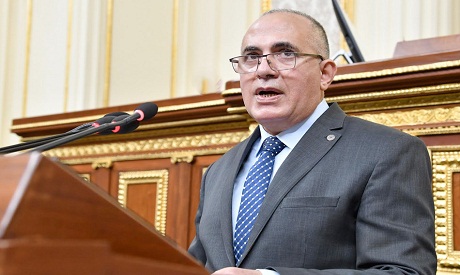
Egypt's Minister of Irrigation and Water Resources Mohamed Abdel-Ati (Photo: Khaled Mashaal)
Egypt's Minister of Irrigation and Water Resources Mohamed Abdel-Ati told MPs on Sunday that negotiations over the Grand Ethiopia Renaissance Dam (GERD) have so far failed to reach a favourable conclusion.
“It is Ethiopia's intransigence that has so far led the GERD negotiations to not reach a fair agreement between the three concerned countries: Egypt, Ethiopia, and Sudan,” said Abdel-Ati.
He explained that the GERD negotiations were first brokered by the United States. “With the help of [former] US Secretary of Treasury Steven Mnuchin, Washington was able to broker a balanced agreement on the filling and operation of Ethiopia’s GERD,” said Abdel-Ati, adding that “while Egypt initiated the draft agreement, Ethiopia decided to withdraw from the Washington talks, claiming it needed time for internal consultations.”
Abdel-Ati indicated that “even when the African Union took charge of the GERD negotiations and Sudan's Prime Minister, Abdullah Hamdok, started an initiative in this respect, Ethiopia was only keen to disrupt technical and legal agreements that had been reached in Washington.”
“Four meetings have so far been held under the supervision of the African Union, not to mention that the Ministers of Irrigation and Foreign Affairs in the three countries have also met five times, trying to reach an agreement,” said Abdel-Ati, stressing that “Ethiopia's intransigence led all of these meetings to fail.”
Abdel-Ati said the ministries of irrigation and foreign affairs are currently trying their best to manage the GERD crisis and prevent negotiations from collapsing.
“We are keen on Ethiopia's Renaissance Dam not negatively affecting Egypt's quota of the Nile water, and I want to stress that this is the most important file for all state authorities in Egypt right now.”
“While we, the Ministry of Irrigation, are working on the technical aspects, the Ministry of Foreign Affairs is dealing with the political and legal dimensions of the GERD file,” said Abdel-Ati.
According to Abdel-Ati, 97 percent of Egypt's water resources come from outside the country. “Egypt needs as much as 114 billion cubic metres of water every year to meet its population and development needs,” said Abdel-Ati, adding that “we have 80 billion cubic metres from local resources, namely the Nile and desalination stations, and 20 billion cubic metres from water recycling projects.”
“This means we still suffer from a water deficit of 14 billion cubic metres,” said Abdel-Ati, indicating that “the government plans to spend EGP 250 million in the next five years to implement water management projects.”
“We aim to move in four directions: using modern irrigation techniques on a wide scale, developing local water resources, raising efficiency of water usage, and building more water projects,” said Abdel-Ati.
Short link: